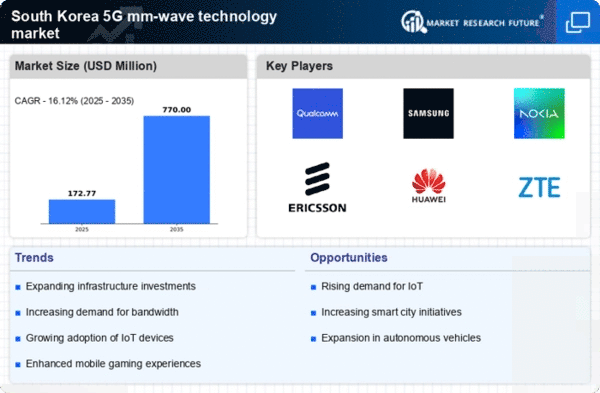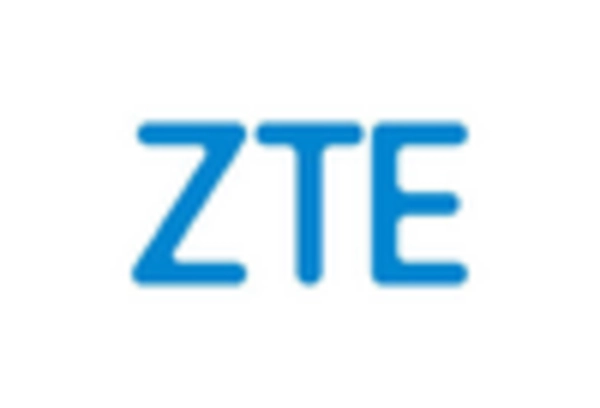Increased Adoption of IoT Devices
The proliferation of Internet of Things (IoT) devices in South Korea is a significant factor driving the 5g mm-wave-technology market. As more devices become interconnected, the demand for high-speed, reliable communication networks intensifies. The 5g mm-wave-technology market is well-positioned to meet this demand, as it offers the necessary bandwidth and low latency required for seamless IoT operations. Current estimates suggest that the number of IoT devices in South Korea could exceed 30 million by 2026, further emphasizing the need for advanced telecommunications infrastructure. This growing ecosystem of IoT devices is likely to propel investments in the 5g mm-wave-technology market, as companies seek to leverage the benefits of enhanced connectivity.
Government Initiatives and Support
The South Korean government actively promotes the 5g mm-wave-technology market through various initiatives and policies aimed at enhancing digital infrastructure. With a commitment to invest approximately $1.5 billion in 5g technology by 2026, the government seeks to bolster the nation's position as a leader in telecommunications. This support includes subsidies for research and development, as well as incentives for private sector investments. Such initiatives are likely to stimulate growth in the 5g mm-wave-technology market, encouraging companies to innovate and expand their offerings. Furthermore, the government's focus on creating a favorable regulatory environment may facilitate faster deployment of 5g mm-wave technology, thereby enhancing connectivity and driving economic growth across multiple sectors.
Expansion of Smart City Initiatives
The development of smart cities in South Korea serves as a crucial driver for the 5g mm-wave-technology market. As urban areas increasingly adopt smart technologies, the need for high-speed, low-latency communication becomes essential. The integration of 5g mm-wave technology enables real-time data processing and connectivity for various applications, including traffic management, public safety, and environmental monitoring. With the South Korean government investing heavily in smart city projects, the 5g mm-wave-technology market is likely to experience substantial growth. Reports indicate that the smart city market in South Korea could reach $10 billion by 2027, creating a fertile environment for the deployment of 5g mm-wave technology and its associated applications.
Competitive Landscape and Market Dynamics
The competitive landscape of the telecommunications sector in South Korea plays a pivotal role in shaping the 5g mm-wave-technology market. Major players, including SK Telecom, KT Corporation, and LG Uplus, are engaged in a race to enhance their 5g offerings, which drives innovation and investment in the market. These companies are likely to invest heavily in research and development to improve network performance and expand service capabilities. Additionally, the presence of numerous startups focusing on 5g applications may further intensify competition, leading to a dynamic market environment. As these companies strive to capture market share, the 5g mm-wave-technology market is expected to witness rapid advancements and a diverse range of service offerings.
Rising Demand for High-Speed Connectivity
The increasing demand for high-speed internet connectivity in South Korea significantly impacts the 5g mm-wave-technology market. As consumers and businesses alike seek faster and more reliable internet services, the need for advanced telecommunications infrastructure becomes paramount. The 5g mm-wave-technology market is poised to benefit from this trend, as mm-wave frequencies offer higher data rates and lower latency compared to previous generations. According to recent data, the demand for mobile data traffic is expected to grow by over 40% annually, further underscoring the necessity for robust 5g networks. This surge in demand is likely to drive investments in the 5g mm-wave-technology market, prompting telecom operators to enhance their service offerings and expand coverage.
















